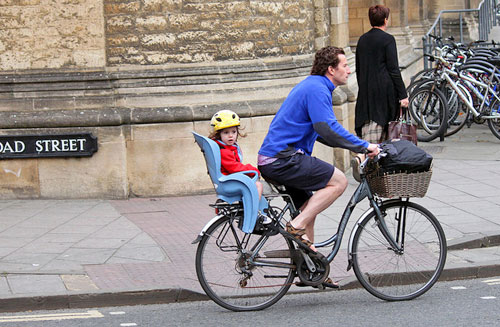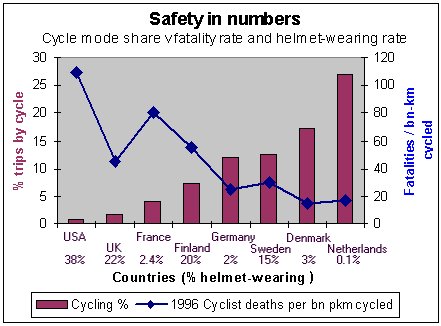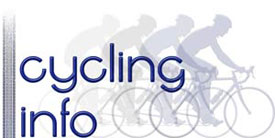Now that Lord Bradley Wiggins of Kilburn has confirmed that he doesn’t want to make cycle helmets compulsory, I feel it’s safe to rehash an old post on cycle helmets. I have a strong fear this topic may have been covered by one or two other people on the internet today already, but I’m sure the internet won’t break under the strain of yet another opinion piece on cycle helmets.
BTW: If I could give cyclists one piece of safety advice, it would simply be don’t pass on the inside of large vehicles like buses and lorries. That advice would make much difference and significantly reduce fatalities from cycling. It’s no good having a cycle helmet if you get caught under a bus turning left.

The argument for cycle helmet compulsion is that it would protect cyclists from head injuries and make cycling safer.
Critics argue that if we did have compulsory helmet use, it would likely cause a significant fall in cycle rates, with little actual impact on reducing fatality rates. The fall in cycle use would have adverse impact on the health of the population, which outweighs any benefits from better protection in accidents. Lower cycle numbers can make roads even more vulnerable to cyclists. Furthermore promoting cycle helmet misses the point about cycle safety. The real key is to prevent accidents in the first place.
Also, you could argue it is not just cyclists who suffer head injuries, more head injuries are sustained by pedestrians and people in motor cars, so where does the call for compulsion end?
Key Issues
1. Helmets are Limited in Their Ability to protect Cyclists. There are numerous studies about the safety potential of cycling helmets; like any set of studies, you can be selective to find statistics to support your position. But, I think it is fair to say that on balance, helmets can play a role in minimising injury for certain types of cycling injury. However, there are also many cycling accidents where helmets unfortunately cannot save lives. Helmets can help in some circumstances. The safety design for cycle helmets are tested for low speed impact.
‘Helmets are designed to protect against injury whilst cycling at 12mph and falling onto the ground.’
In a very good article by Owen Jones at the Independent, he quotes this statistic:
One study of 100 police fatality reports by the Department for Transport suggested that wearing helmets could have prevented 10 to 16 per cent of deaths, but the sample was too small to count as conclusive evidence.
Even a 10% improvement in saving lives is a a strong encouragement to wear a helmet. To put it in context, there are roughly 110 fatalities from cycling each year. If this study has some accuracy, perhaps 10-20 could have been avoided through use of cycle use. It is enough to make me wear a helmet. But, in the context of wider fatalities (e.g. deaths from obesity / lack of exercise – it is pretty small.)
2. Compulsory Helmet Use Reduces Cycling
In Australian and Canadian cities where helmets have been made compulsory, cycle use has fallen.
Gillham and Rissel, 2012 showed that on a per capita basis there were 37.5 percent fewer Australians riding bikes in 2011 than in 1985-86. (link)
3. Health Costs of falling cycle rates
This reduction in cycling can have various health costs such as: increased risk of heart disease and obesity. This is one of the biggest problem facing society. BMJ argue against compulsory helmet use because of health benefits of cycling [link]
For example, the number of children killed cycling in the UK, averages about 1-2 a year (whether helmet use would have saved these 1-2 children is uncertain to say the least. The number of children who are obese and face creating future health problems is a rising % of the population.
CTC argues that 15% of children aged between six and 15 were obese in 2001, numbers which are expected to rise to one fifth of boys and a third of girls by 2020.
Therefore, the highest priority of society should be to try and encourage greater physical exercise amongst the young population. Yes, cycling does have risks attached; but, we have to feel that sitting in front of a computer playstation eating fast food all day also has a much bigger hidden risk.
4. Moral Hazard. This argument say that if people wear a helmet they feel safer and more willing to take risks. This lulls people into a fall sense of security. If cyclists feel vulnerable they will take more caution - and it is this that is the best way to protect against serious injury. On the other hand, you could argue people who wear helmets value their safety more and so are just as likely to cycle responsibly if not more so.
5. Do Drivers Change their behaviour When cyclists wear helmets?
Some studies have claimed that wearing a helmet encourages drivers to pass closer to cyclists. If you look unprotected, drivers are more likely to give you space. (problem of cycle helmets)
It is interesting that the strongest calls for compulsory helmets often come from motorists. In fact some drivers get really annoyed if cyclists are not wearing helmets. Maybe concentrate on driving rather than hoping that your bad driving will be saved by a cycle helmet.
5. Cycle Culture and Fatalities

Countries with the lowest % of trips by cycle have the highest % of helmet use and the highest fatalities per bn /km
Helmet use in Netherlands is very low. Yet, fatalities per bn km is only 20. This compares to the US where 38% where helmet but fatalities per bn km is over 100 – five times greater than the US.
There are many ways to interpret this. But, higher helmet use is only a very limited factor in determining fatality rates.

If you want to reduce fatality rates and improve cycle safety, the key is to create an environment, infrastructure and culture which supports safe cycling.
A cycle helmet may help in a small % of accidents. But, the real key is preventing accidents in the first place. (legacy for cycling)
Conclusion
- Cycle helmets can help in some accidents.
- Compulsory helmet use is likely to significantly reduce cycle use, with little noticeable improvement
Random notes
- When I see adults without helmets part of me thinks – that’s good they have confidence to cycle on British roads without armoured plating
- When I see children without helmets, I always think of how vulnerable a child’s head is, and wish they had a helmet on.
- I really worry that people with little experience of cycling will blame cyclists if they don’t have a helmet on. e.g. a cyclist dies from a broken vertebrae because a car ran into him, but the judge dismisses claims because a cyclists wasn’t wearing a helmet.
Related
- If you do use a helmet, make sure it is fitted correctly. See: How to fit a cycle helmet
- Compulsory cycle helmet law discussed at BBC
- Cycle Helmets at Evans Cycles
- Reasons to wear a cycle helmet
- Cycle Helmet – an site criticial of helmet compulsion and helmet promotion

I was brought down one night by, I think, ice. I hit the road with such a wallop that my helmet split. Knowing what would have split had I not been wearing it, I have become positively evangelical about the benefits of riding with a helmet.
Wearing a helmet is definitely good practice and is a good example to set for my son. However, like you say, a helmet probably won’t make to much difference if you get crushed by a bus.
There is a lot of criticism from cyclists of other road users. There are a few idiots on the road but the majority give good space. We as cyclists also need to take some responsibility. I see so many cyclists on commutes taking unnecessary risks. Simple things like sitting in the middle of the road at lights so people don’t cut you up, pulling out when turning in good time, not cutting inside of large vehicles and not jumping red lights are just a few things that can help. Following the rules of the road and using common sense.
Maybe there should be compulsory tests like there are for all other vehicles on the road?
Noone seems to have mentioned this, but I find that other road users take me more seriously and give me plenty of space and time when I look like I care( with a helment, lights If necessary).
Tejvan, what’s the reference for your second graph please? I’d like to use the data but can’t really talk about some random graph I saw on the internet! Cheers.
Greg, It was from http://www.cyclehelmets.org/ Can’t find page just at meoment
I think that people have forgotten that cycle helmets reduce the chance of serious injury . they might not be perfect but it,s better than none!
Got any evidence for your statement that helmets reduce the chance of serious injury, or is it just opinion based on assumption, based on guesswork?
I cycle defensively. Which doesn’ t mean slowly, but I keep a watch out for other road users who might act as if I wasn’t there. My cycling is for commuting, on roads and cycle paths. If I were out for a fast road cycle, I would wear a helmet in the mistaken belief that if I had an accident and came off, my helmet would save my life. Maybe. Maybe not. At the end of the day it is a personal choice. Many cyclists do wear helmets and lets not stop them doing so. As for me, if the sun shines, the helmet stays at home so I can enjoy the weather and cycling. Having got to 60 and not had an accident where I needed a helmet, then maybe I’ll continue to accept the low risk to me.
I have read a number of articles on this area and would say the following:
The stats seems to support that helmets will give protection up to 12 miles an hour; I would have thought most city and urban cyclists who use bikes to commute, as opposed to hobbyists are below this speed level and therefore would have some benefit from wearing on.
Helmets should be mandatory for small children riding in back seats on bikes, if the bike tips their head is going to be the first point of contact.
All off road cyclists should wear helmets; no cars to blame and plenty of trees to headbutt.
Those who say ‘if they make helmets compulsory I will never ride again’ are drama queens who are cutting off their nose to spite their face.
If you don’t want to wear one; fine – it’s your skull.
The stats don’t show that helmets provide protection up to 12mph, it’s just that the tests the helmets are subjected to are about that speed, but there is vanishingly small evidence that helmets protect.
Children have been strangled by their helmet straps, but there is no proven case of a helmet saving a child’s life, so you want to impose something that has killed children but can’t be shown to have saved any.
Mass cycle helmet wearing is not associated with reduced risk to cyclists. This is long term, large population, reliable data which is much more reliable than that used by helmet zealots.
You might like to read a little about the subject cyclehelmets.org
There is a sad tendency in our society to create an atmosphore of fear – everything is dangerous. And yes I agree – you can actually die of being alive.
There is no evidence, that helmets on bikes make any difference at all. The day helmets are compulsory I think I will cry.
Study this further for information on helmets: http://www.copenhagenize.com/2012/07/open-letter-to-danish-mps-against.html
And the blog in general if interested in what safe cycling is: http://www.copenhagenize.com/
Yeah and they reduce visibility when they slip over your eyes and the increased diameter increased the torsional rotation forces and car drivers actually look at your head before deciding how aggressively they are going to overtake and it messes up my hair and everything and middle aged lady cyclists should practice rolling off a bike at 25 mph like 19 year old Para’s do for ‘P’ company and there was this really bizzare and totally believable time right when this thing happened & and this person was totally killed by a bicycle helmet and that proves they are more dangerous than rabid pit bulls so there.
Its been a long time since I’ve read such petulant nonsense.
Grow up, wear a helmet stupid.
@Mike Greaves,
“Grow up, wear a helmet stupid”
The author of the article does wear a helmet (see the end of “Key Issue 1″). They just don’t believe in making them mandatory.
I’m in agreement on both points (I always wear a helmet, but wouldn’t want it to be mandatory). Because the argument over whether it’s worthwhile to wear a helmet is subtly distinct from the argument over whether it’s a good idea to make it mandatory.
I think it would be reasonable to include in your conclusions that cycle helmets *may* increase the likelihood of an accident in the first place – for the reasons you give in points 4 and 5, as well as the reduced visibility Don mentions.
I would assume that the report referred to in point 1 only looked at cyclists who had been in a fatal accident, since is based on fatality reports. If so, the (inconclusive) ~10% benefit could easily be outweighed by a relatively low increase in risk of accident. Also, did they consider the possibility that helmets could actually contribute to the likelihood of a head injury in an accident – particularly a torsional or indirect injury which the helmet wouldn’t mitigate against? Without access to the report who knows.
Of course there will be all kinds of varying risks for different speeds and environmental factors, but in general I think most people who wear helmets do so because it seems intuitively safer, rather than because of any kind of clear evidence-base. Hence it seems even less fair to make helmet use compulsory.
“But, I think it is fair to say that on balance, helmets can play a role in minimising injury for certain types of cycling injury.”
OK, so how do you explain that nowhere that helmet wearing has significantly increased, whether due to a law or promotion, has been able to show any reduction in risk to cyclists?
Face facts, helmets don’t work, it’s been proved in over 20 years of experience that they don’t work, so stop promoting them. Just stop.
Wearing a helmet reduces visibility and ensures that some motorists take risks when overtaking and dont give cyclists a wide berth. The govt should try enforcing the law against motorists who drive while uninsured or who drive recklessly before they start introducing misguided anti-cyclist legislation.
“Wearing a helmet reduces visibility”
I’m not convinced. A well-fitting helmet shouldn’t block off much but the very top of your vision, and how often do you need to see an impending bird attack anyway? Whereas the shade from the sun in your eyes can actually be rather handy.
“ensures that some motorists take risks when overtaking and dont give cyclists a wide berth.”
I’m also unconvinced. Would this be based on that one study by one bloke in Bristol? Because I haven’t seen any other evidence for it.
I too had a car run into me, it was on a mini roundabout, ‘sorry mate didn’t see you’, My bike was wrote off, I broke the windscreen with the back of my head and hit the road rolling, I’m glad I wasn’t wearing a helmet otherwise my injuries could have been much worse, I escaped without so much as a cut but plenty of bruises. A helmet could have twisted my head as I hit the road, possibly causing a broken neck and or severe brain injury. No helmet for me, thanks. A crash helmet, yes, a cycle helmet, no. [ Anecdotal evidence is no guide to the efficacy or otherwise of cycling helmets]
as anew cyclist i do think that cycle helmets should be worn, as new to this sport i recently had a accident where a car cut me up causing me to come off the bike, if not for the helmet the injuries would have been a lot worse.
Anthony, the only dissenter so far? Your statement “i do think that cycle helmets should be worn” seems alright, although I’ve always been anti-helmet.
But the authority? The ‘State’ should not decide, and while the governments of both the US and UK are currently (I would say) out of control in trying to regulate every detail of every moment of our lives, to protect ourselves from ourselves, as it were, the tide of opinion seems to be turning.
When I raced bicycles (in the ‘eighties), the then US Cycling Federation (now the USAC) required only leather hair-nets (remember them?), and the professionals rode bareheaded or in caps. My club (the CRCA in NYC) didn’t require helmets to race.
We would take training or beater bikes onto the grass and practice falling, learning to tuck and roll if we escaped our clips or landing on arms tight to our sides to avoid broken collarbones (anecdotally the most common injury among racers – not head injuries).
On my ‘blog (about “kickbikes” not bicycles) I also have cited the Australian site cycle-helmets.com. Its page on Risk compensation is an eye-opener, especially the image at the top.